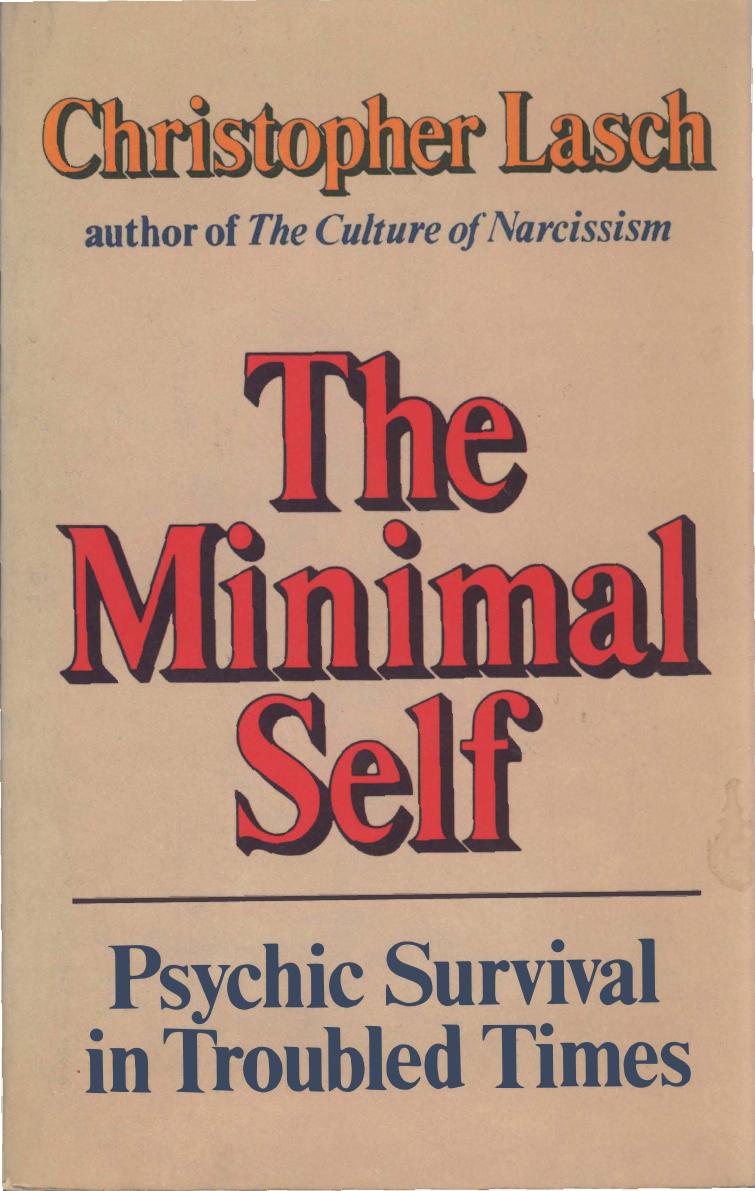The Minimal Self: Psychic Survival in Troubled Times by Christopher Lasch

Author:Christopher Lasch [Lasch, Christopher]
Language: eng
Format: epub, pdf
Publisher: W. W. Norton & Company
Published: 1985-10-16T21:00:00+00:00
Narcissism as Opposed to Ordinary Egoism If the search for self-esteem and lost perfection leads to contradictory results, this reflects the contradictory quality of narcissism itself, an overwhelming desire to live in a state of ecstatic freedom from desire. Grunberger argues in his study of narcissism that because it is rooted in experiences that antedate the awareness of separation, narcissism should be distinguished both from libidinal instincts and from the instinct of self-preservation and understood as a separate “system” altogether independent of the instinctual desire for bodily gratification. Narcissism evinces a certain indifference to bodily desires. It wishes “to exist on this earth free from both desire and body.” For this reason, Grunberger rejects Freud’s definition of narcissism as a libidinal counterpart of the self-preservative instinct. Narcissism precedes the emergence of the ego, which originates in an awareness of individuation. In its original form, narcissism is oblivious to the self’s separation from its surroundings, while in its later form, it seeks always to annul awareness of separation. It has only “contempt,” Grunberger writes, for the “puny and timorous” ego. In its ceaseless search for perfect equilibrium and union with its surroundings, it resembles not so much a libidinal investment of the ego as that elusive “Nirvana principle” Freud tried to capture in his dubious formulation of the death instinct. Except that it is not an instinct and that it seeks not death but everlasting life, narcissism conforms quite closely to Freud’s description of a longing for the complete cessation of tension, which seems to operate independently of the pleasure principle (“beyond the pleasure principle”) and follows a “backward path that leads to complete satisfaction.” Narcissism longs for the absence of longing, the absolute peace upheld as the highest state of spiritual perfection in so many mystical traditions and also upheld, as we have seen, in so much contemporary art and literature. It seeks to free itself from the prison of the body, not because it seeks death—though it can lead people to commit suicide—but because it has no conception of death and regards the bodily ego as a lower form of life, besieged by the clamorous demands of the flesh. It follows a “backward path” to a lost paradise, but it can also become the basis of a mature idealism so exalted that it will sacrifice bodily comfort for a cause, even life itself, preferring death to dishonor.
Its scorn for the body’s demands and for the ego that has to respond to them, while at the same time holding them in check, distinguishes narcissism from ordinary egoism or from the survival instinct. Having no understanding of death, narcissism is indifferent to the issue of survival.* The awareness of death and the determination to stay alive presuppose an awareness of objects distinct from the self. The ego’s separate existence and its helpless dependence for life on caretakers outside itself underlie the fear of mortality. Since narcissism does not acknowledge the separate existence of the self, as distinguished from the bodily ego, it has no fear of death.
Download
The Minimal Self: Psychic Survival in Troubled Times by Christopher Lasch.pdf
This site does not store any files on its server. We only index and link to content provided by other sites. Please contact the content providers to delete copyright contents if any and email us, we'll remove relevant links or contents immediately.
Rewire Your Anxious Brain by Catherine M. Pittman(18634)
Talking to Strangers by Malcolm Gladwell(13340)
The Art of Thinking Clearly by Rolf Dobelli(10410)
Mindhunter: Inside the FBI's Elite Serial Crime Unit by John E. Douglas & Mark Olshaker(9312)
Becoming Supernatural by Dr. Joe Dispenza(8196)
Change Your Questions, Change Your Life by Marilee Adams(7732)
Nudge - Improving Decisions about Health, Wealth, and Happiness by Thaler Sunstein(7689)
The Road Less Traveled by M. Scott Peck(7590)
The Lost Art of Listening by Michael P. Nichols(7486)
Mastermind: How to Think Like Sherlock Holmes by Maria Konnikova(7313)
Enlightenment Now: The Case for Reason, Science, Humanism, and Progress by Steven Pinker(7303)
Win Bigly by Scott Adams(7183)
The Way of Zen by Alan W. Watts(6592)
Daring Greatly by Brene Brown(6501)
Big Magic: Creative Living Beyond Fear by Elizabeth Gilbert(5745)
Grit by Angela Duckworth(5593)
Ego Is the Enemy by Ryan Holiday(5409)
Men In Love by Nancy Friday(5230)
The Laws of Human Nature by Robert Greene(5156)
